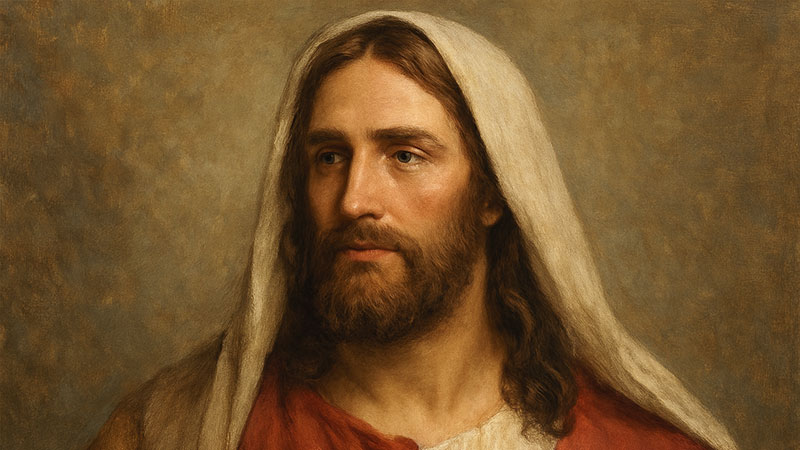In the beginning was the Word, and the Word was with God, and the Word was God. For ages, this Word existed in the fullness of divine glory, a timeless and transcendent presence.
But then, something extraordinary happened, a moment that changed the course of history and eternity. The uncreated, infinite God chose to become finite, to enter His creation. The Bible refers to this incredible event as the Incarnation, a profound mystery in which heaven and earth converge.
This wasn’t a mere visitation; it was a complete immersion. John 1:14 announces this incredible truth: “And the Word became flesh and dwelt among us, and we have seen his glory, glory as of the only Son from the Father, full of grace and truth.”
This verse is the heart of the Christian faith, the bridge between the Old Testament prophecies and the New Testament reality. It tells us that God didn’t just speak from a mountaintop or send a prophet; He came down, wrapped in human skin, to be with us.
Read More: Jesus’ Miracles in the New Testament
God’s Dwelling Place Among Us
The phrase “dwelt among us” is especially powerful. The original Greek word for “dwelt” is skēnoō, which means to pitch a tent or tabernacle. This imagery directly connects to the Old Testament, where God’s presence, known as the Shekinah glory, dwelt in the tabernacle among the Israelites.
But now, God’s dwelling place was not a temporary structure made of cloth and wood; it was a human body, a life lived out in the dusty streets of Galilee. Jesus, the Son of God, was the new and ultimate tabernacle.
His life was the revelation of God’s character, a character of incredible grace and unwavering truth. The glory John speaks of wasn’t just a blinding light but the glory of a perfect life, of selfless love, miraculous power, and profound compassion.
This was a God who understood hunger, who wept at the death of a friend, who felt the sting of betrayal, and who knew the pain of humanity firsthand.
The Fullness of Grace and Truth
Grace and truth are two sides of the same divine coin. John 1:17 states, “For the law was given through Moses; grace and truth came through Jesus Christ.” The law, though good and holy, exposed our sin and showed us our need for a Savior. But Jesus brought something more; He brought the solution.
His grace is the unmerited favor of God, the freely given forgiveness and power to live a new life. His truth is the reality of God’s plan and character, revealing the way to reconciliation and peace. In Jesus, these two attributes are perfectly balanced and beautifully expressed.
Through His life, death, and resurrection, Jesus demonstrated the ultimate act of grace and truth. He took our sin upon Himself, paying the debt we could never repay, and in doing so, He offered us a relationship with the Father.
This is not a distant, academic faith. It is a deeply personal and transformative relationship, made possible by the Word who became flesh. He didn’t just show us what God is like; He showed us what it means to be fully human, living in perfect communion with God.
A Personal Invitation
The Incarnation is more than a historical event; it’s an ongoing invitation. The Word became flesh so that you and I could experience God not just as a distant deity but as a loving Father. He tore down the veil of separation so that we could boldly approach His throne of grace.
He lived among us so that we could be born again into His family. The central truth of John 1:14 is that God wants to be known by you. He wants to have an intimate, transformative relationship with you.
This is the power of the Gospel: the Creator of the universe stepped into our world, lived our life, and died our death so that we could live His life.
We are invited to see this glory, called to receive this grace, and asked to believe this truth. The story of the Word made flesh is the story of God’s relentless pursuit of His people, a story that culminates in the simple, yet profound, invitation to come home.
Read More: Seeing God, The Face of the Father: John 14:9
FAQ
It’s important because it explains how God, the eternal Word, became a human being in the person of Jesus Christ. This central truth, known as the Incarnation, is the foundation of Christian faith, showing that God bridged the gap between heaven and earth to be with us.
This phrase means that Jesus was God in a human body. “The Word” refers to Jesus’ divine nature, and “became flesh” means He took on full humanity. “Dwelt among us” uses imagery of pitching a tent, showing that God set up His dwelling place with people, just as He did with the ancient Israelites in the tabernacle.
This phrase describes the perfect character of Jesus, who fully revealed both God’s loving, unmerited favor (grace) and His perfect, unwavering character and plan (truth). This balance is essential because it shows that while God is holy and just, He is also loving and merciful, offering salvation to all who believe.









Add comment